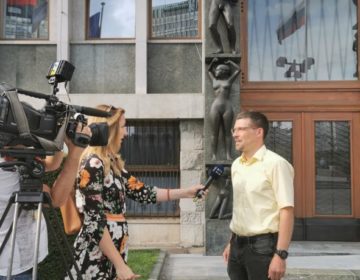Actions of Slovenian Authorities after the Decision No. U-I-269/12
The deadline for implementation of the Decision No. U-I-269/12 expired on 9 January 2016. However, the Slovenian Authorities have not started with its implementation. Instead, the informal social networks with a significant power over education and significant influence on decisions important for education system in Slovenia informally claimed that this would be just one another decision of the Constitutional Court that will never be implemented. This “prophecy” is now being realized.
From the public claims of politicians, we have realized that the politics will never implement the Court Decision for the ideological reasons. Thus, we filed a new petition to the Constitutional Court on June 2016. The Court has not decided yet about this Case No. U-I-110/16, but it examines our petition as an absolute priority. In this petition, we allege that the failure to enforce the mandatory Court decision (Case No. U-I-269/12) violates the rule of law (Article 2 of Constitution) and the division of power (Article 3 of Constitution). We proposed to the Court to step up its decision in a way that the Court itself decides on how to implement its decision, and in this way to protect our constitutional position.
The informal social networks with influence on Slovenian education system stated that the Case No. U-I-269/12 revealed a “disorder in Slovenian Constitution”. Due to this reason, they motivated the political structures of National Assembly to start changing the Constitution in 2016. This has not been successful, since they were not able to get required 2/3 of all votes of the Constitutional Commission members. They failed for one single vote.
Consequently, the informal social networks with influence on Slovenian education system pressed the politics to make the law changes in a way that the position of the petitioners will become even worse. In such a way, they try to punish the petitioners, since we alleged that the law is inconsistent with the Constitution and we won the case. By doing this, the non-formal social networks manifest their power and “warn” other individuals that the fight for human rights could never be paid.
The Primary School Act divides the state-approved primary education programmes into two parts, into the compulsory and the elective program. Both of them together form the state-approved public education programme and both of them are necessary to achieve the objectives of education, required by the Article 2 of the OFEA. However, the politics who followed the ideas of the informal networks with the influence on Slovenian education system proposed to increase the financing for the compulsory programme from (current) 85% to 100% and to decrease the financing of the elective programme from (current) 85% to 0%. This will lead to the situation that the petitioners who won the Case No. U-I-269/12 will become into even worse position as they were before the Court decision, since the public financing of the complete state-approved public education programme will decrease from (current) 85% to approx. 65%. The law proposal was, therefore, in 2017 rejected by National Assembly.
However, the Court Decision No. U-I-269/12 has still not been implemented. Thus, in April 2019 the Government proposed the same solution as in 2017 (to increase the financing for the compulsory programme from 85% to 100% and to decrease the financing of the elective programme from 85% to 0%). On 19 June 2019 the National Assembly decided that the Government proposal (given by the Minister of Education, Science and Sport Dr. Jernej Pikalo) is appropriate for further consideration. On 1 July 2019, the same decision was made also by the Committee for Education, Science, Sport and Youth (led by Mag. Branislav Rajić, SMC Party), which is a working body of the National Assembly. This happened, although the Legislative and Legal Service of National Assembly has warned that the Government proposal could be inconsistent with the Court decision No. U-I-269/12 as well as with several Articles of Constitution. They also warned that in a constitutional democracy the individual is a subject and not an object of the functioning of the authorities, while his or her (self)realization as a human being is the fundamental purpose of the democratic order.
Before the final vote, the Committee tried to make incremental improvements of the Government proposal by applying some amendments. However, the amendments were rejected. Thus, the Committee should vote about the basic law proposal, recognized as inconsistent with Constitution in opinion of the Legislative and Legal Service.
The first paragraph of Article 82 of Constitution says that deputies of the National Assembly are representatives of all the people and shall not be bound by any instructions. However, it is a usual practice in Slovenian National Assembly that deputies violate this constitutional provision by following the orders of their leaders. The same happened at Committee meeting on July 1 2019. The deputy Mr. Jurij Lep (DESUS – Democratic Party of Pensioners of Slovenia) asked to break the Committee meeting for 5 min that he can make a call [to ask], since his vote was “in the air” due to the rejection of the amendments that were brought into line within coalition parties before the meeting.
After the break, the disputable Government proposal was approved by 6 votes against 5. Against voted: SDS (Slovenian democratic parts, 3 votes) and N.Si (New Slovenia Party, 2 votes). The disputable proposal was supported by: SD (Social democrats party, 2 votes), LMŠ (List of Marjan Šarec, 2 votes), SAB (Party of Alenka Bratušek, 1 vote), and DESUS (Democratic Party of Pensioners of Slovenia, 1 vote). The deputies of the following parties did not vote: SMC (Modern Centre Party, 2 votes) and Levica (The Left Party, 2 votes).
We have already supplemented our petition No. U-I-110/16 also by claim that the long-term non-implementation of the binding Court Decision is a violation of Right to a fair trial that is protected by Article 6 of The European Convention on Human Rights. The European Court of the Human Rights regularly warns that right would be illusory if a Contracting State’s domestic legal system allowed a final, binding judicial decision to remain inoperative to the detriment of one party (e.g, see Case Hornsby v. Greece, No. 18357/91, of 19 March 1997). In this way, we are preparing to claim that Slovenia violates the Article 6 of ECHR at the ECtHR.





